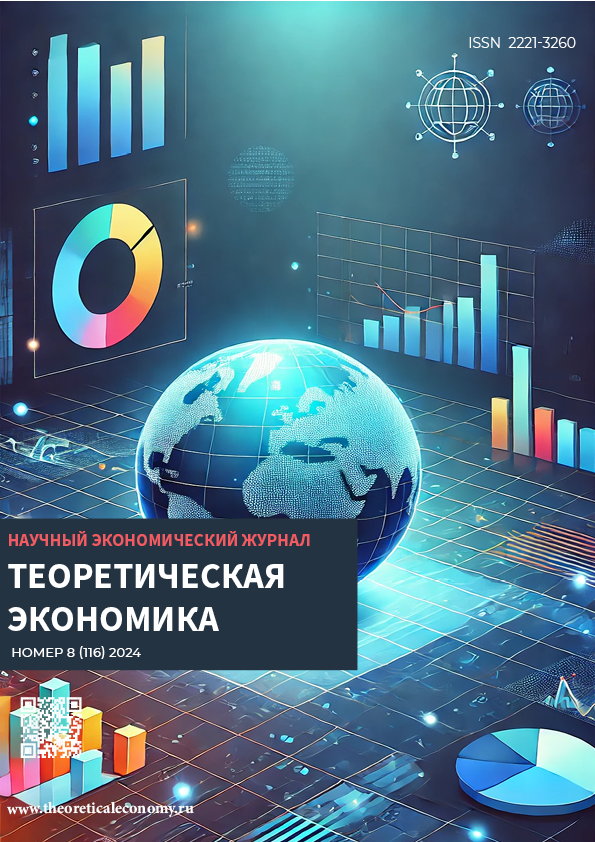Moskva, Moscow, Russian Federation
In economic theory, there are various approaches to determining the structure of a country’s national wealth, many of which are based solely on quantitative indicators. At the same time, traditional economic models do not take into account new factors in the development of national wealth, such as environmental services and digital assets. It seems that despite methodological limitations, the structure of national wealth should include the value of intangible assets, such as intellectual property, human and social capital. Due to the need to take into account multiple aspects and intangible benefits when forming the structure of a country’s national wealth, the authors proposed an institutional approach to determining the structure of national wealth, which is based on an assessment of the institutions and institutional environment that form the self-sufficiency of the national economy. The article discusses the main problems of modern society, which require investment in their elimination and, as a result of a decrease in the share of the country’s national wealth, the problem of measuring the country’s national wealth, due to the undeveloped methods for measuring modern conditions, which are mostly associated with the digitalization of economic, social and political processes, the structure of the country’s national wealth in the digital economy is proposed, an institutional approach to determining the structure of national wealth, based on the principle of self-sufficiency of the country’s economy, is proposed and justified.
institutions, institutional environment, national wealth, sustainable development, digitalization, human capital
1. Bogatstvo kak mentalitet i tvorchestvo ekonomicheskogo razuma / A. E. Kenzhibaev, I. V. Lavrov, A. N. Popov. — Ekaterinburg: UrGEU, 2003 — 144 s.
2. B'yukenen, Dzh. Izbrannye trudy / Dzh. B'yukenen // Nobelevskie laureaty. T.1. — M.: Taurus Al'fa, 1997 — S. 23–84.
3. Vaynshteyn A. Ot obobschayuschih makroekonomicheskih pokazateley k nacional'nym schetam // Statistika narodnogo bogatstva, narodnogo dohoda i nacional'nye scheta. M.: Nauka, 1967. 370 s.
4. Dement'ev, G. M. Sinergizm menedzhmenta kak sovremennaya osnova formirovaniya nacional'nogo bogatstva / G. M. Dement'ev. — Chelyabinsk: UralGUFK, 2009 — 264 s.
5. Klark, Dzh. Raspredelenie bogatstva. Per. s angl. / Dzh. Klark. — M.: Al'fa, 2000 — 216 s.
6. Kritskiy M.M. Chelovecheskiy kapital. JI.: Izd-vo Leningr. un-ta, 1991.
7. Kilin P.M. Vosproizvodstvo regional'nogo obschestvennogo produkta. -M.: Nauka, 1984.
8. Nesterov L.I. Osobennosti vosproizvodstva nacional'nogo bogatstva v nachale XXI veka. M., 2006.
9. Popova, E. A. Kontraktnaya paradigma formirovaniya nacional'nogo bogatstva / E. A. Popova, I. V. Lavrov, G. M. Dement'ev. — M.: VNIETUSH, 2004 — 144 s.
10. Popov, A. N. Menedzhment kak kognitariat i osnova formirovaniya nacional'nogo bogatstva / A. N. Popov, G. M. Dement'ev. — Chelyabinsk: UralGUFK, 2007 — 64 s.
11. Osadchaya T.G., Smolina E.E. Nacional'noe bogatstvo v Rossii: kak upravlyat' effektivno?: monografiya. Tambov, 2005.
12. Popov, A. N. Menedzhment v sisteme kollektivnogo predprinimatel'stva i formirovaniya nacional'nogo bogatstva / A. N. Popov, Yu. D. Doronin, G. M. Dement'ev. — Chelyabinsk: UralGUFK, 2008 — 96 s.
13. Rikardo, D. Nachala politicheskoy ekonomii i nalogovogo oblozheniya. Per. s angl. / D. Rikardo. — M.: Ekonomika, 1987 — 460 s.
14. Smit, A. Teoriya nravstvennyh chuvstv. Per. s angl. / A. Smit. — M.: Ekonomika, 1997 — 318 s.
15. Sopernichestvo teoriy kak osnova genezisa politicheskoy ekonomii / V. L. Bersenev, A. I. Tatarkin, A. G. Shelomencev. — Ekaterinburg: Institut ekonomiki UrO RAN, 2005 — 81 s.
16. Fedorenko N.P. Rossiya na rubezhe vekov. M., 2003.
17. Cagolov N.A. Voprosy istorii politicheskoy ekonomii. M.: Izd-vo Mosk. Un-ta, 1984. - 408 s.
18. Chelovecheskiy kapital Rossii na rubezhe XXI veka. Monografiya pod red. I.V. Il'inskogo SPb.: SPGUTD, 1999-200 s.
19. Chelovecheskiy kapital : Ucheb.-metod. posobie /A. I. Dobrynin, S. A. Dyatlov, S. A. Kurganskiy. SPb.: Izd-vo S-P. gos. un-ta ekonomiki i finansov, 1999-209 s.
20. Chihireva N.V. Reprodukciya prirodnyh resursov v sostave nacional'nogo bogatstva v usloviyah sovremennoy sistemnoy transformacii. // Teoreticheskaya ekonomika. – 2022. – №12(96). – S. 23-31.
21. Chihireva N.V. Izmeneniya v sostave nacional'nogo bogatstva v usloviyah transformacii social'no - ekonomicheskoy sistemy // Voprosy politicheskoy ekonomii. – 2022. – №2(30). – C. 124-132.
22. Chihireva N.V. Evolyuciya vzglyadov o nacional'nom bogatstve v usloviyah transformacii social'no-ekonomicheskoy sistemy. // Teoreticheskaya ekonomika. – 2021. – №8(80). – S. 84-91.
23. Chihireva N.V. Sistematizaciya celey razvitiya chelovecheskogo potenciala v kontekste teorii nacional'nogo bogatstva. // Teoreticheskaya ekonomika. – 2022. – №6(90). – S. 121-129.
24. Derek H. Aldcroft. European economy 1914-2000. (Manchester Metropolitan university), 2001, 344 p.109. «Expanding the measure of wealth», Ch. 3 The World Bank, 1997.
25. Goldsmith R. A perpetual inventory of national wealth // Studies in income and wealth. N. Y. National bureau of econ. research, 1951. Vol.14.
26. Kunte A. and others «Estimating National Wealth: Methodology and Results». The World Bank, 1998
27. Mincer J. The Production of Human Capital and The Lifecycle of Earnings: Variations on a Theme. Working Paper of the NBER, No 4838 (Aug. 1994)
28. Miles D., Scott A. Macroeconomics: understanding the Wealth of Nations. 2001,704 p.
29. Mulligan C.B., X. Sala-i-Martin. Measuring Aggregate Human Capital. -Working paper of the NBER, No 5016 (Feb. 1995)
 This work is licensed under Creative Commons Attribution-NonCommercial-NoDerivatives 4.0 International
This work is licensed under Creative Commons Attribution-NonCommercial-NoDerivatives 4.0 International


















